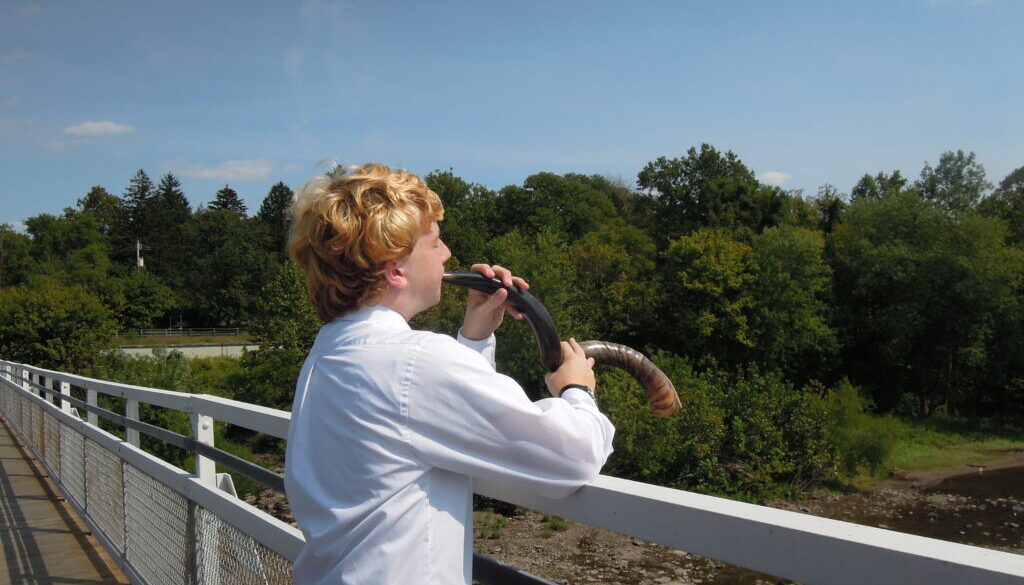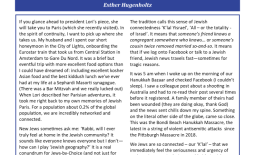Yom Kippur Day Sermon
Dear Soul,
It is strange and hard times and we have travelled far, you and I. Each of our souls, everyone of us here on Zoom or in the ether of the universe, has embarked on an unexpected journey this year.
Be still, my soul, the Psalmist sings. Isn’t that soothing? Isn’t that what the current moment cries out for? Between the Ashamnu’s and Al Chets, the Avinu Malkeinu’s and the countless ‘Baruch Ata Adonai’s’, between the words of the Machzor and the folds of our Torah scroll, where do we find this stillness? Pummeled and unsettled, for reasons good and ill, our souls are battered with important existential questions, afflicted with deep consciousness about the brokenness of our world and placed under the duress of continued isolation, loneliness and social distancing.
Be still, our soul. Be still.
There is so much here to distract us today; to inflame us; to incite our passions, our judgments, our anger and pain. In our first sermon-letter these High Holiday, we confronted God with some hard questions. In our second letter, we confronted the human collective with even harder questions. And now, it is our task to tend to our ruach, spirit-breath, nefesh, our life-force and neshamah, our soul. Let each of us speak to our own unique souls in tenderness, humility and honesty.
We are not yet midway through today’s journey. We have started our process of contemplation with Kol Nidrey, flexed our spiritual muscles with the morning prayers and whetted the sharpness of our minds on our Torah reading. Before us still lies the mountain and beneath it lies a garden. We will hike a lot and schlep a little up this mountain; we are tired and aching, perhaps intimated and confused at what is coming next, perhaps discomforted by this strange Yom Kippur, yearning for the familiarity and presence of other human beings, trying to decipher the ancient prayers and come to terms with their powerful and difficult ideas. Perhaps we are weary of dragging our feet and we are, dare we say it, bored, hungry, thirsty and fidgety.
Still, we see this mountaintop that carries the fortress of our prayers, its many turrets holding transformational experiences of our being.
We just read about the rituals of the High Priest on Yom Kippur. The arcane rituals laid out here in this 16th chapter of Leviticus are difficult to connect to. We can be overly fixated on trying to parse them that we forget one very crucial detail: the text opens with death. ‘Acharei mot sh’nei b’nei Aharon m’karvatam lifnei Adonai’ – ‘after the death of the two sons of Aaron who had drawn close to the Holy One.’ Only a few chapters earlier, the Mishkan—the portable temple that the Israelites used during their desert sojourning—had been finished and ritually inaugurated with pomp and exacting, precise ceremony. On the eighth day, Aaron’s sons Nadav and Avihu in their religious enthusiasm and youthful passion bring an unauthorized offering of aish zara, ‘strange fire’. Without fully telling us why, the Torah tells us that God smote them and they instantly perished.
Aaron, as a Priestly vessel of holiness, could only offer silence. ‘Vayidom Aharon’, the Torah tells us elsewhere. ‘And Aaron remained silent’ as he went about the business of officiating on this first terrifying, agonizing Yom Kippur. Can we imagine how Aaron lost himself in the details, just like we lose ourselves to the fact that he is a deeply traumatized person? Aaron just lost his children. His world has been cracked open and torn asunder. And still, he has to get up there, put on his spiritual ‘personal protective gear’, cleanse himself and bring his offerings. He has to carry on. And not only that, he has to have the presence of mind to ‘v’chiper ba’ado uvad beito’, ‘to atone for himself and his house’.
Aaron has just undergone the most cataclysmic event in his life and he is expected to function with surgical precision and at once reflect on his own frailty? That’s too much to ask from a grieving father; it would be too much to ask from any of us.
Oh dear souls, there is so much trauma. Trauma upon trauma.
Isn’t it the same for us? We are in the middle of the great cataclysm of our time. Our senses are dulled, our spirits defeated. Yet, carry on we must; with surgical precision as we put on our ritual garb of face masks and face shields, of purifying our hands with soap and water or hand sanitizer, as we isolate the mail and disinfect the groceries. We are expected to function at a higher order of magnitude when all we want to do is crawl up in a corner. And the end isn’t in sight.
Perhaps all we want is to be in the ‘demamah’, the silence. To be still and to be comforted. But like Aaron, continue we must. Today, we are all Aaron. All of our souls were present at that Yom Kippur, thousands of years ago; just like our souls are present at this Yom Kippur, not imagined in one hundred years.
The journey of our souls is a dance between the metaphor and reality. As we continue to ascend and travel through this day, we will encounter the high drama of the Musaf service; with its elements of awe and trembling, of forgiveness and hope. Our souls can nestle themselves in each individual prayer, align themselves with each motif that vibrates on our frequency. The language is difficult and poetic, confrontational and gracious; raw and elegant, all rolled into one; a worthy attempt by our tradition to speak to our human condition.
And so, we become Aaron; we are Aaron. A friend of mine taught me some Torah on Facebook, reminding us holy lonely Aaron must have been in the complete and utter silence of the Holy and Holies, as well as heartened by community when he came out to greet the people. We too can find both solitude and together in the silence of the Amidah, in rituals of rising and bowing, singing and silence, of confession, atonement and forgiveness. How will our souls be stirred during the Unetaneh Tokef and the Aleinu? And how will we draw taut the sacred threat of our people’s history between that first Yom Kippur and this Yom Kippur? As we move towards Musaf; towards the Avodah service, let each and every one of our souls reflect on this momentous invitation. We are called to become Aaron. We each become the High Priests of our souls. Our prayers are a time capsule; our Machzor a time machine. We relinquish the power granted to us by modernity and align ourselves with what is ancient and intuitive. We are the Priests and Priestesses garbed in white, who are humbled and purified, brought low and risen up by the mystery of the Universe. And in that crucible of our prayers, on this most holy of days, we can pour our both our wonder and our pain.
We will climb that mountain, dear ones. We will reflect on what has been a year unlike any other year. We will atone and try to make amends; confront our human frailty and celebrate our capacity for forgiveness, love and hope. Like the two goats Aaron offers, one for the wilderness and one for God, we carry both inside of us: the wilderness and the Divine; the untamed and the abundantly loving.
Be still, oh my soul. Make space in the silence so that our hearts of stone may be turned to flesh. In the song and in the silence, we will find forgiveness and love, with healing in its wings. We will journey together and be wearied and be restored, in this Holy of Holies; the sanctuary that we build for ourselves at these perilous and heartbreaking times. We find each other’s souls, we are each other’s strength. What is yet to come we cannot fathom but we will face it together. ‘Hashiveinu Adonai eleicha v’nashuvah, chadesh yameinu k’kedem’ – Return ourselves to You, Holy One, and let us return; renew our days as in days of old.
Amen.



